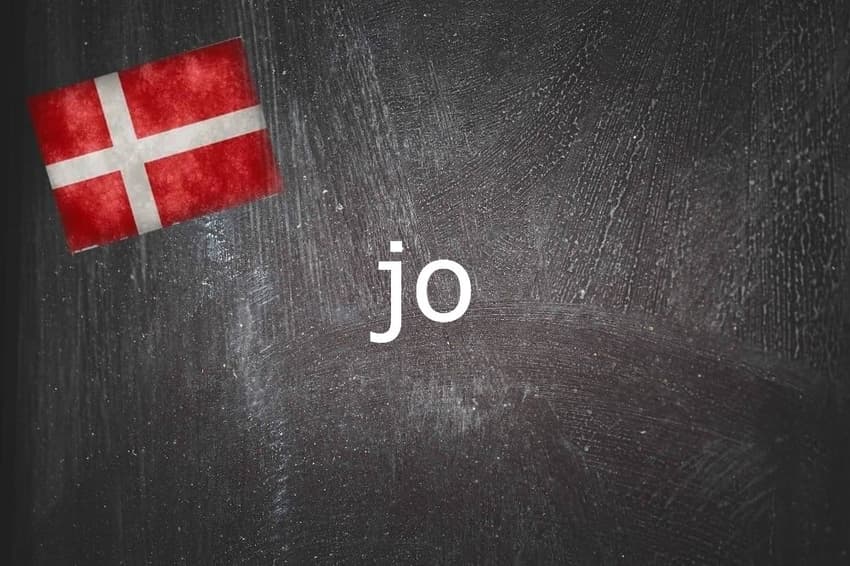Danish word of the day: Jo

Photo by Francesco Ungaro on Unsplash and Nicolas Raymond/FlickR
Jo and ja both mean yes in Danish. But when do you use one or the other?
What is jo?
Jo, like the word ja, means yes – but knowing which of the two to use is often tricky for Danish learners.
A reasonably simple rule to remember is that ja is used for affirmative answers to positive questions...
Taler du dansk? Ja (Do you speak Danish? Yes)
… and jo is used when answering negated questions in the affirmative:
Taler du ikke dansk? Jo (Don't you speak Danish? Yes [I do])
Jo is also often used to thank someone for their well wishes, with the subtext that the wishes are overly generous:
Du må have en fantastisk weekend! – Jo, tak, i lige måde
”Have a fantastic weekend” – Sure, thanks, same to you”
Or when arguing with someone: "Nej!" "Jo!" "Nej!" "Jo!"
In other words, it is used to mark that the answer to a negative question is not what might have been expected or to express an opinion which is different from what someone else just said, but it can also express reluctant agreement ("jo, men..." "yes, but...") or be used at the a start of a sentence to make sure you have people's attention before you get to the point, the same way an English speaker might use "well" or "so".
Why do I need to know jo?
Jo may be a short interjection, but it is full of nuances that can be interpreted differently depending on tone of voice, inflection or use of extra words: an impressed "jo jo" can be used to mean "well, well", or equally, “yeah, yeah”.
If you answer a negated question like kan du ikke lide det (“don’t you like it?”) with ja instead of jo, you will be understood but the response will probably jar a bit in the ears of a Dane. It takes some practice to remember which form of “yes” to use in answering a question, but it certainly helps you sound more natural once you get the hang of it.
Jo can also be used in the middle of a sentence to add emphasis. This use is near-impossible to translate, but is used when something is being stated with certainty: der er jo kun 24 timer i døgnet (“there are [obviously] only 24 hours in a day”).
Kommer du ikke? Jo, jeg skal bare lige gøre noget
Are you not coming? Yes, I just need to do something
Dansk er ikke et svært sprog. Jo, det er det!
Danish is not a difficult language. Yes, it is!
Comments
See Also
What is jo?
Jo, like the word ja, means yes – but knowing which of the two to use is often tricky for Danish learners.
A reasonably simple rule to remember is that ja is used for affirmative answers to positive questions...
Taler du dansk? Ja (Do you speak Danish? Yes)
… and jo is used when answering negated questions in the affirmative:
Taler du ikke dansk? Jo (Don't you speak Danish? Yes [I do])
Jo is also often used to thank someone for their well wishes, with the subtext that the wishes are overly generous:
Du må have en fantastisk weekend! – Jo, tak, i lige måde
”Have a fantastic weekend” – Sure, thanks, same to you”
Or when arguing with someone: "Nej!" "Jo!" "Nej!" "Jo!"
In other words, it is used to mark that the answer to a negative question is not what might have been expected or to express an opinion which is different from what someone else just said, but it can also express reluctant agreement ("jo, men..." "yes, but...") or be used at the a start of a sentence to make sure you have people's attention before you get to the point, the same way an English speaker might use "well" or "so".
Why do I need to know jo?
Jo may be a short interjection, but it is full of nuances that can be interpreted differently depending on tone of voice, inflection or use of extra words: an impressed "jo jo" can be used to mean "well, well", or equally, “yeah, yeah”.
If you answer a negated question like kan du ikke lide det (“don’t you like it?”) with ja instead of jo, you will be understood but the response will probably jar a bit in the ears of a Dane. It takes some practice to remember which form of “yes” to use in answering a question, but it certainly helps you sound more natural once you get the hang of it.
Jo can also be used in the middle of a sentence to add emphasis. This use is near-impossible to translate, but is used when something is being stated with certainty: der er jo kun 24 timer i døgnet (“there are [obviously] only 24 hours in a day”).
Kommer du ikke? Jo, jeg skal bare lige gøre noget
Are you not coming? Yes, I just need to do something
Dansk er ikke et svært sprog. Jo, det er det!
Danish is not a difficult language. Yes, it is!
Join the conversation in our comments section below. Share your own views and experience and if you have a question or suggestion for our journalists then email us at [email protected].
Please keep comments civil, constructive and on topic – and make sure to read our terms of use before getting involved.
Please log in here to leave a comment.